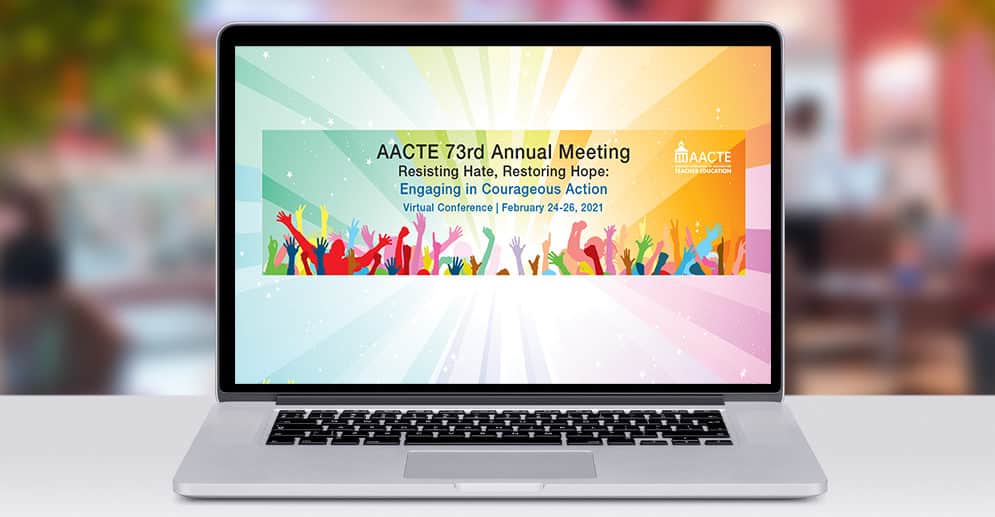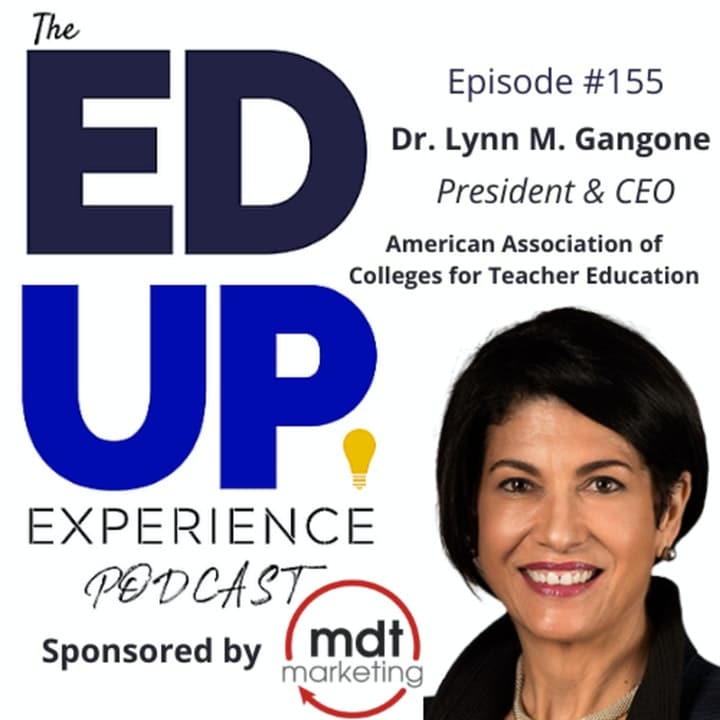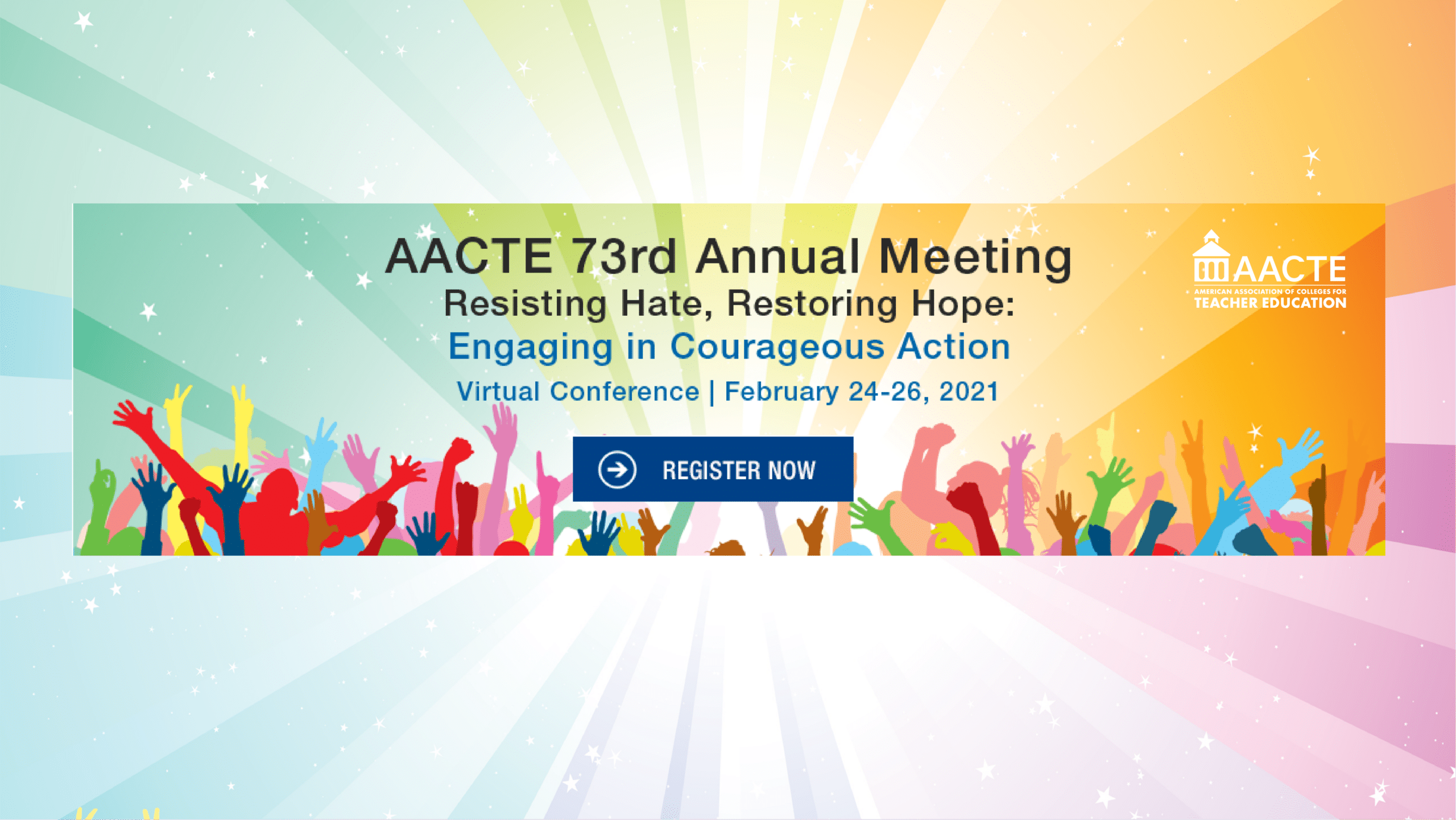Join AACTE in Building Education Back Better
Warm Regards,
One feature of the AACTE Annual Meeting will be panel discussion about the uses of edTPA, for accountability, support for teacher learning, and program improvement. The session is scheduled for Wednesday, February 24, from 4:00 – 5:15 pm EST.
Some teacher educators see edTPA as a valuable tool, but other have concerns. Recent research has described its weaknesses as a criterion for high-stakes decisions about individual teachers. This session is intended to help teacher educators and policy makers appreciate the variety of ways edTPA is being conceptualized and implemented, with the associated variation in positive and negative consequences.
 This blog post is written by AACTE consultant Jane West and is intended to provide updated information. The views expressed in this post do not necessarily reflect the views of AACTE.
This blog post is written by AACTE consultant Jane West and is intended to provide updated information. The views expressed in this post do not necessarily reflect the views of AACTE.
House and Senate Press Forward with First Steps to Pass Biden COVID Relief Package
In dramatic moves in both the House and Senate last week, the stage was set to enact President Biden’s $1.9 trillion COVID relief package. Early in the week the House passed a Budget Resolution followed by Senate passage of a Budget Resolution early Friday morning—with a tie-breaking vote by Vice President Harris. The Budget resolution is the shell that will initiate the creation of legislation that will form the COVID-19 relief package. Because the Senate Resolution is different from the House resolution, the House will next take up the Senate version and pass it so that both bodies are working from the same playbook.
In Part 1 of this article, the authors talked about how as teacher preparation program professors in different areas of the United States, they managed to still provide valuable, worthwhile, and innovative professional development for their preservice educators and graduate students who are in-service teachers, despite the myriad ways in which COVID-19 derailed the spring semester.
In Part 2, the authors share the feedback from their students who participated in the virtual professional development.
We, six collaborators, banded together to provide professional development for pre- and in-service teachers’ professional learning experiences during their transition to emergency remote teaching (Hodges et al., 2020) through a self-initiated professional learning community (SIPLC) (Pinnegar & Hamilton, 2009). Adopting this widely practiced research method among teacher educators (Hamilton & Pinnegar, 2013), the collaboration aimed to deepen the understanding of preservice and in-service teachers’ experiences in the SIPLC as they transitioned to remote teaching under the pandemic (DuFour & Eaker, 1998; Song et al., 2020) using Zoom recordings.
Authors David A. Fuentes and Johanna Torres of William Paterson University, along with Andrew Morse of the University of Northern Iowa, will present a Learning Lab during the AACTE 2021 Annual Meeting, “Navigating Student Supports in a Financial Crisis” on Wednesday, February 24, 10:00 – 11:00 a.m. In this article, Fuentes and Torres highlights their university’s efforts to support its diverse student population.
The unanticipated COVID-19 pandemic that hit in earnest of March of last year resulted in an abrupt disruption of teaching and learning at William Paterson University in northern New Jersey, as it did at institutions of higher education throughout the country. Students, faculty, and staff readied to quickly acclimate to our new learning ecology, one that was rife with technological challenges, but we were less prepared to understand the scope and breadth of the other hardships to come. Like other public universities located in the Mid-Atlantic region, March 2020 brought about changes at our institution that included the closure of our physical campus space, a loss of the varied and structured physical learning communities, and many of the physical opportunities that drove our community and kept us in touch with students and each other. Our offices designed around student support, civic engagement and campus life had to be re-imagined embracing the digital learning environments that faculty and students were creating. Adding to the dynamic change was a sense of urgency as our community, like others, began experiencing loss of a magnitude only experienced by previous, war-ravaged generations.
 The AACTE Committee on Information and Technology will host a Deeper Dive session at the AACTE 2021 Annual Meeting, “Applying Technology-enhanced Teaching Strategies to the New Normal in 2021 and Beyond” on Thursday, February 25, 11:15 a.m. – 12:30 p.m. The committee members offer a preview of the panel discussion in the following article.
The AACTE Committee on Information and Technology will host a Deeper Dive session at the AACTE 2021 Annual Meeting, “Applying Technology-enhanced Teaching Strategies to the New Normal in 2021 and Beyond” on Thursday, February 25, 11:15 a.m. – 12:30 p.m. The committee members offer a preview of the panel discussion in the following article.
Over the past year, educators have learned much about technology in teacher education. Technology has become the classroom and often the location of field placements. While many of these learnings were forced due to the pandemic, lessons learned can be carried forward into 2021 and beyond to create improved responsive teacher preparation programs in the future at all levels of education. As a result, the AACTE Committee on Innovation and Technology Committee is offering a Deeper Dive session that includes teacher preparation experts discussing the lessons learned from remote learning and ways to move forward post-COVID with technology in teacher preparation. The Deeper Dive session will include panelists from a wide variety of teacher preparation institutions to discuss their particular lessons learned from the challenges of the pandemic. Furthermore, our panelists will share how we can move forward in teacher preparation to prepare new and veteran teachers to teach with technology in 2021 and beyond. Our panelists include the following:
Authors Caroline Forrest and Cori Woytek will be presenting a live Q&A session at the 2021 Annual Meeting, “Using Video Across Diverse Settings to Provide Meaningful Feedback & Facilitate Reflective Conversations,” Thursday, February 25, 1:30 – 2:30 pm.
Providing resident teachers with meaningful feedback to improve their instructional practices is—and always has always been—a hallmark of our teacher education program here at Western Colorado University. Through the use of video coaching, which we implemented four years ago, we’ve been able to ensure this feedback is even more effective, rich, and applicable.

Educator preparation programs have experienced a tumult of change in the last 12 months. Many of our members have experienced decreased enrollment in initial licensure teacher education programs, all during a nationwide teacher shortage. Now, more than ever before, it is our responsibility to consider what may be creating barriers for candidates to enter our programs and our profession. AACTE plans to support member institutions’ examination of assessments used for entry into preparation programs and the barriers they create for potential candidates, especially candidates of color.

As AACTE’s hosts its first virtual Annual Meeting, we talked with our AV production company, Manor Hill Productions, to share information on what the attendees can expect during the meeting.
Many associations have transitioned their conference to a virtual setting due to COVID-19. What are important aspects for a successful virtual conference/platform to ensure attendees have a valuable experience?
To get the most out of their virtual experience, we encourage you to explore the platform and familiarize yourself with where things are and how to navigate around. Similar to entering a hotel or convention center and finding where the meeting rooms are, the same can be said about a virtual environment. Click around the space and follow the links to understand where everything is located. Visit the exhibit floor, see where the breakouts and main stage sessions will be. Look at the agenda and decide when your desired sessions will be taking place. Everyone wants to network. If you are looking for specific people you can seek them out to chat and catch up. Just because it is a virtual environment does not mean you lose the ability to connect.
 AACTE is pleased to announce the College of Education and Human Development at the Texas A&M University, as the next home to the Journal of Teacher Education (JTE) editorial team. The editors were selected through a rigorous peer-review process and approved for a 3-year term, beginning in 2021, which can be extended for an additional 3 years.
AACTE is pleased to announce the College of Education and Human Development at the Texas A&M University, as the next home to the Journal of Teacher Education (JTE) editorial team. The editors were selected through a rigorous peer-review process and approved for a 3-year term, beginning in 2021, which can be extended for an additional 3 years.
The current editorial team at Michigan State University, which has served the JTE since 2015, will continue work on the journal through June 2021 to complete Volume 72.
“AACTE celebrates Texas A&M in their selection as the next editorial team for our flagship Journal of Teacher Education. Their team of scholars has the demonstrated experience, respect, and vision to lead the journal into its next chapter,” said Lynn M. Gangone, AACTE president and CEO of AACTE. “JTE is steadily increased its impact on the field under the tenure of the current editorial team at Michigan State University. AACTE owes a debt of gratitude to the tremendous editors at MSU, including incoming Board Chair, Dean Robert Floden, Dr. Gail Richmond, Dr. Dorinda Carter, and Dr. Tonya Bartell.”
Register now for the AACTE 73rd Annual Meeting, February 24-26, 2021. Visit aacte.org for details, follow us on Twitter and Facebook, and join the conversation using #AACTE21.
Come experience the reimagined AACTE Annual Meeting – One community. One purpose. One voice.
Questions – Need Assistance?
Please contact us at events@aacte.org
 AACTE President and CEO, Lynn M. Gangone is the latest guest on The EdUp Experience podcast with Elizabeth Leiba and Joe Sallustio, EdD. In this episode, Gangone covers the timely topic of the important role teachers play in our society, especially now more than ever.
AACTE President and CEO, Lynn M. Gangone is the latest guest on The EdUp Experience podcast with Elizabeth Leiba and Joe Sallustio, EdD. In this episode, Gangone covers the timely topic of the important role teachers play in our society, especially now more than ever.


AACTE is excited to introduce AACTE Connect360, an engaging and interactive online community that will link individual educators from its 700 member institutions to bring educator preparation full circle. Attendees at the AACTE 2021 Annual Meeting, February 24-26, will be among the first to preview the latest, members-only resource, designed for members to start discussions, share best practices, and ask and respond to questions of their colleagues on topics that impact educator preparation and the profession.
AACTE is the leading resource for the ed prep community, and with AACTE Connect360 members will facilitate more active discussions and fill a need for program-specific, peer-to-peer support within educator preparation. The digital, collaborative platform will also allow members on the AACTE Board of Directors, on committees, in Topical Action Groups, and in the Holmes Program to stay connected, share files, and store resources within their dedicated communities.

During the virtual AACTE 2021 Annual Meeting, attendees are invited to join their peers at the Learning Lab session, Disrupting Inequities: Local and Global initiatives for Shared Responsibility in Diversity, Equity, and Social Justice on Friday, February 26, 10:00 – 11:00 a.m. AACTE member
Michael W. Apple of the University of Wisconsin addresses this topic in the following thought leadership article.
Schools, particularly public schools, are under a great threat right now. And as education leaders, it’s imperative that we understand the current environment. There is a growing anger towards our educational system that is visible statewide and at a national level. Fueled by restorative politics, many of those who have lost their faith in public schools believe that educators place too much emphasis on equitable education. Yet, while much more needs to be done, the simple fact that some people are criticizing schools must mean that we must be doing something right already. If we weren’t working at interrupting racial injustice many people, especially those who are ultra-rightists, wouldn’t be so angry at schools and teachers.
 Join your colleagues at the 2021 Annual Meeting for a deep exploration of “Leading During Difficult Times.” AACTE will continue the conversation from its 2020 Leadership Academy in two sessions focused on ways education leaders can navigate the challenges of the current global environment. This second part of the Academy will include guided panel discussions and a close examination of successful case stories.
Join your colleagues at the 2021 Annual Meeting for a deep exploration of “Leading During Difficult Times.” AACTE will continue the conversation from its 2020 Leadership Academy in two sessions focused on ways education leaders can navigate the challenges of the current global environment. This second part of the Academy will include guided panel discussions and a close examination of successful case stories.
The Leadership Academy sessions at this year’s Annual Meeting include
Strategic Planning and Leadership: COVID-19 Edition
Wednesday, February 24
1:30 – 2:30 p.m.
In this session, leaders will engage in strategic planning for the coming months as we approach a post pandemic world. Attendees will assess what has been tried and learned so far during the pandemic, envision the upcoming year, using what has been learned to outlining new initiatives post pandemic. Participants will discuss how to engage faculty and staff, organize their interactions, and process their experience. Participants will leave with an action plan for developing new initiatives.